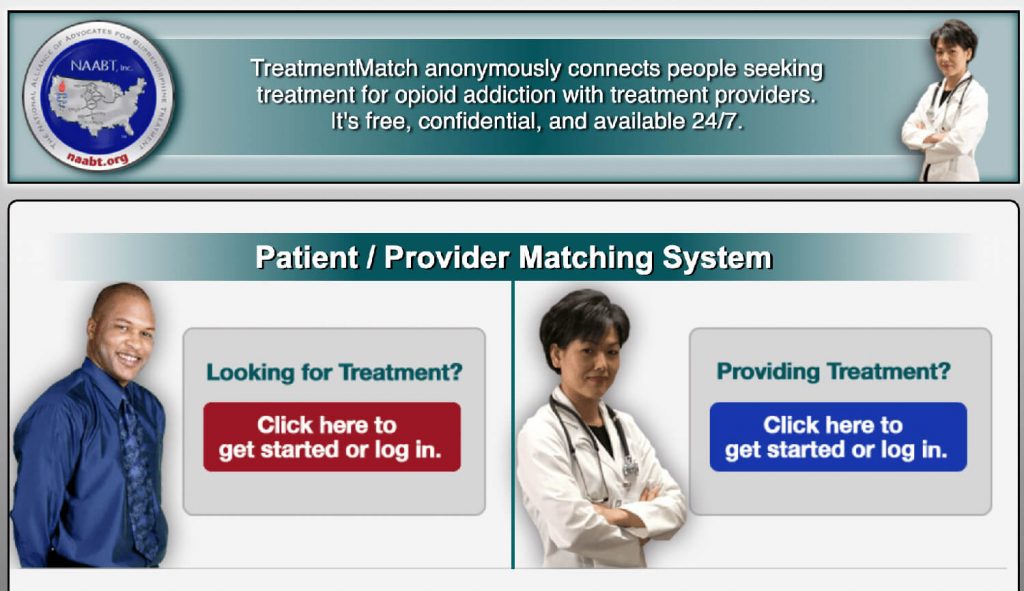Looking for a Suboxone clinic near you? Here’s everything you need to know about how to find a Suboxone treatment provider near you.
Various kinds of medical providers prescribe Suboxone and other buprenorphine products to treat opioid addiction in and out of Suboxone clinic settings. Sometimes it can be frustrating to find a clinic accepting new patients.
But there is hope! Here are strategies for finding a Suboxone clinic or a doctor who will prescribe Suboxone in an office setting, near you:
1. Be prepared when you call Suboxone clinics.
Suboxone.com used to offer a directory at one time of providers, but sadly they’ve stopped offering this resource. There are other directories on this list, ranked in order of accuracy. Sometimes, it’s simpler to do an online Google search for Suboxone doctors and look for local results. Keep in mind that many centers will offer information on this topic, but not all will be in your area.
Prepare questions and call each location near you, or get the names of providers near you and do further research online.
Strategies for calling Suboxone doctors’ offices:
Prepare to make calls:
-
Set aside an hour of your day. Take the time off of work, or take your lunch break early or late and sit in your car so you have privacy from coworkers at the office, and make the calls.
-
Keep a notebook and pen with you while you call.
-
Keep calling until you’ve reached out to everyone in your area. It’s easy to get discouraged, but you deserve recovery.
If you have to leave a voicemail, leave them:
-
your name
-
phone number
- type of insurance
-
and the best time for the office to get back in touch with you
When you do get in touch with someone, have your questions prepared:
-
When is their next available appointment?
-
How much does the program cost? Will they accept your insurance for the program?
-
How often will you be required to come in?
-
Are there counseling requirements?
-
If you have state insurance, ensure they’ll be able to work with you to get your medication covered at the pharmacy via a prior authorization, if that is necessary.
“Just like with any medical issue, it can feel like you’re speaking a foreign language when reaching out for help with opioids,” explains Kate Monti, MSW/MSI and Chief Operating Officer at Workit Health. “Healthcare, in general, is complicated, and the regulations around Suboxone treatment make it harder to find care. If you have questions, ask them. If you need something explained, say so.”
Remember the people answering the phone are professionals. They aren’t there to judge you or your history. They want to help you get treatment. That being said, if a Suboxone clinic’s phone team seems to have an especially bad attitude or if you aren’t able to get through to them at all, consider looking elsewhere.
2. Request a match through the NAABT’s TreatmentMatch locator.
The National Alliance of Advocates for Buprenorphine Treatment attempts to solve the issue of wading through providers who aren’t taking new patients with its TreatmentMatch directory. This is a very smart, and underutilized, resource.
Enter details about your history and the type of treatment you prefer anonymously, and providers in your area who are accepting new patients can then reach out to you through the system with their contact information.
Your request stays completely anonymous—no providers are ever given your contact information directly. You can review provider information, and choose whether or not it looks like an appropriate fit for you. If so, give them a call. You know they’re taking patients as they contacted you first.

3. Check with your primary care doctor to see if they’re able to prescribe Suboxone.
There is no shame in letting your general practitioner know you’re struggling with opioid addiction. You can ask them to help you with medication-assisted treatment like Suboxone. The more those of us who are personally affected by addiction speak up, the more medical providers will understand they need to make treatment readily available. Our doctors don’t know we need treatment until we tell them.
Although it’s commonly assumed that you must seek addiction treatment apart from primary care, there is a push to have primary care doctors prescribe Suboxone and other buprenorphine medications. Some primary care physicians, in response to the opioid crisis, are choosing to treat opioid addiction. As long as they have taken the training to prescribe controlled substances, they can legally prescribe Suboxone. If your primary care doc won’t personally prescribe Suboxone, they may know another doctor who will be able to help.
4. Look for telehealth treatment options.
Healthcare is making strides to keep up with technology, and addiction treatment is no exception. At Workit Health, we offer online Suboxone treatment via telehealth in several states. This allows us to treat people from more rural areas where Suboxone doctors are more difficult to find.
Get more information about Workit Health’s online addiction care programs.
5. Review SAMHSA’s buprenorphine provider locator.
That’s right, there’s another Suboxone directory on this list! If you can’t find a provider on Treatmentmatch.org, head over to SAMHSA’s Physician Locator to find physicians and medical assistants who will prescribe buprenorphine.
According to the NAABT, about half of all doctors listed aren’t accepting new patients. Don’t let that discourage you. Follow the call guidelines set out above and reach out to everyone in your area. Getting your life back from opioid addiction is worth the work!
6. Look into methadone clinics in your area, and see if they offer buprenorphine.
This is really where the whole idea of a so-called “Suboxone clinic” comes from. Methadone clinics, or what are officially called opioid treatment programs (OTPs), are specifically regulated and have a different style of treatment than office-based opioid addiction treatment.
Usually, you’ll come in once a day for medication like methadone or buprenorphine, and gradually earn the privilege to take home medication as you adhere to therapy, pass drug testing, and progress in the program. Opioid treatment programs are often state or federally funded, making them an affordable option.
Another advantage of checking out methadone clinics? They may be willing to prescribe Subutex for on-site dosing if you prefer that medication. Many Suboxone clinics aren’t willing to do that, as Subutex has a higher risk of diversion.
It can feel exhausting to find a Suboxone clinic or doctor currently accepting patients near you. But don’t let that discourage you. Finding a supportive care team to help you meet your recovery goals is absolutely worth it.
Not sure what to expect or still unsure if Suboxone treatment is right for you? Check out this helpful video from the Partnership for Drug-Free America, which breaks down what to expect at your first visit at a Suboxone clinic.








